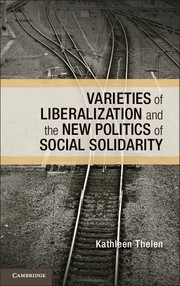Book contents
- Frontmatter
- Dedication
- Contents
- List of Figures
- List of Tables
- List of Abbreviations
- Preface
- 1 Varieties of Liberalization and the New Politics of Social Solidarity
- 2 Industrial Relations Institutions
- 3 Vocational Education and Training
- 4 Labor Market Policy
- 5 Coalitional Realignments and Institutional Change
- 6 The Future of Egalitarian Capitalism, in Light of Its Past
- Appendix A Components of Index and Descriptions of Variables for Figure 1.1
- Appendix B Components of Index for Figures 6.2 and 6.3
- Bibliography
- Index
6 - The Future of Egalitarian Capitalism, in Light of Its Past
Published online by Cambridge University Press: 05 June 2014
- Frontmatter
- Dedication
- Contents
- List of Figures
- List of Tables
- List of Abbreviations
- Preface
- 1 Varieties of Liberalization and the New Politics of Social Solidarity
- 2 Industrial Relations Institutions
- 3 Vocational Education and Training
- 4 Labor Market Policy
- 5 Coalitional Realignments and Institutional Change
- 6 The Future of Egalitarian Capitalism, in Light of Its Past
- Appendix A Components of Index and Descriptions of Variables for Figure 1.1
- Appendix B Components of Index for Figures 6.2 and 6.3
- Bibliography
- Index
Summary
A central goal of this study has been to attempt to reframe the debate on varieties of capitalism, and in so doing, to shed some light on observed divergent trajectories of institutional change in the political economies of the rich democracies. For the past two decades, scholarship in this area has equated the political-economic institutions associated with liberal capitalism with inequality and those associated with coordinated capitalism with higher levels of social solidarity. Debates have focused on the sources of stability in traditional institutions and the extent of change, particularly within the CMEs. VofC scholars see existing arrangements in these countries as fundamentally robust and resilient due to their efficiency effects – and in consequence of these, to employers’ continuing support for them. VofC critics, by contrast, see these institutions as under siege in the face of a broad neoliberal offensive, and argue that their survival depends on labor's capacity to resist. Against this backdrop, the clear implication seemed to be that the best way to preserve egalitarian capitalism is through a vigorous defense of the institutions that have traditionally defined coordinated capitalism.
The preceding chapters analyzed the political dynamics at work across five countries – the United States, Germany, Denmark, the Netherlands, and Sweden – and in three important institutional arenas – industrial relations, vocational education and training, and labor market policy. Rather than rely on assumptions about the relevant interests, I investigated empirically what employers and unions in different sectors and countries have sought to achieve in these realms. While confirming a broad, shared trajectory of liberalization, I found that there are in fact different varieties of liberalization associated with different distributive outcomes. My analysis links distinct constellations of interests and political-coalitional dynamics to three broad trajectories of change – deregulatory liberalization, dualization, and embedded flexibilization.
- Type
- Chapter
- Information
- Publisher: Cambridge University PressPrint publication year: 2014

